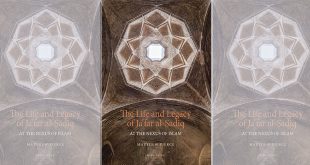Alī ibn Mūsa al-Riḑa (d. 818), a direct descendant of the Prophet Muhammad through his grandson Al-Ḥusayn ibn ‘Alī, is recognized as the eighth Imam within the Twelver Shī‘ī tradition and is also highly revered within the Sunni tradition.
The following is a translation of one of the many pieces of wisdom attributed to him. This specific passage is preserved within the Tuḥaf al-ʿuqūl of the 10th-century scholar al-Ḥasan ibn ʿAli ibn al-Ḥusayn ibn Shuʿba al-Ḥarrānī (d. after 991 A.D.).
Translation
“[Imam ‘Alī ibn Mūsa al-Riḑa] has said: The intellect of a Muslim is not complete until he/she has ten qualities:
1) People can expect only goodness and benefaction from them
2) People can expect to be secure from any wrongdoing and harm from them
3) They consider a small amount of benefaction from others to be abundant and plentiful
4) They consider their own benevolence and goodness to others to be insufficient.
5 They do not tire of the demands and requirements they are asked to fulfill
6) They spend the entirety of their lives seeking knowledge
7) Humble poverty is more beloved to them than wealth and affluence
8) Humility while striving on the path of God is more beloved to them than being exalted while pleasing His enemy
9) Anonymity is more beloved to them than fame
10) They do not encounter another person except that they say “He/she is better and more pious than myself.”
لا يَتِمُّ عَقلُ امرِئ مُسلِمٍ حَتّی تَکُونَ فيهِ عَشرُخِصالٍ: أَلخَيرُ مِنهُ مَأمُولٌ وَالشَّرُّمِنهُ مَأمُونٌ، يَستَکثِرُ قَليلَ الخَيرِمِن غَيرِهِ، وَيَستَقِلُّ کَثيرَ الخَيرِ مِن نَفسِهِ، لا يَسأَمُ مِن طَلَبِ الحَوائِج إِلَيهِ، وَلايَملُّ مِن طَلَبِ العِلمِ طُولَ دَهرِهِ، اَلفَقرُ فِي اللهِ اَحَبُّ اِلَيهِ مِنَ الغِنی، وَالذُّلُّ فِي اللهِ اَحَبُّ اِلَيهِ مِنَ العِزِّ في عَدُوَّهِ، وَالخُمُولُ أَشهی اِلَيهِ مِنَ الشُّهرَةِ، ثُمَّ قالَ عليه السلام: اَلعاشِرَةُ،قيلَ لَهُ:ماهِیَ؟ قالَ عليه السلام: لا يری اَحَداً اِلاّ قالَ: هُوَ خَيرٌ مِنّيِ وَاَتقی
(al-Ḥasan b. ʿAli b. Ḥusayn b. Shuʿba al-Ḥarrānī, Tuḥaf al-ʿuqūl fi ma jaʾa min al-ḥikam wa l-mawāʿiẓ min ʾal al-rasūl.
 Ijtihad Network Being Wise and Faithful Muslim in the Contemporary World
Ijtihad Network Being Wise and Faithful Muslim in the Contemporary World
